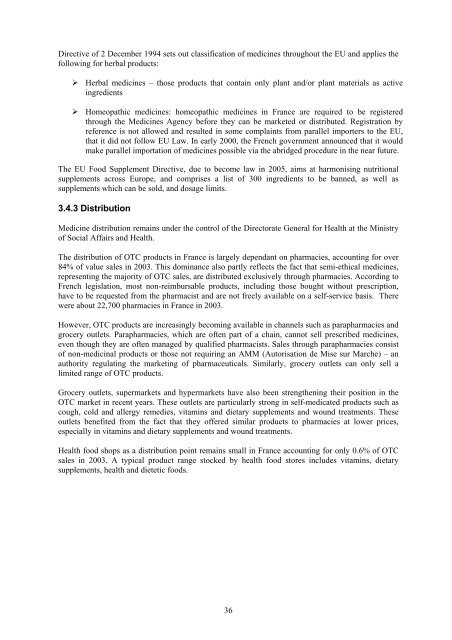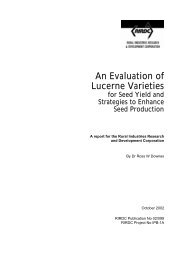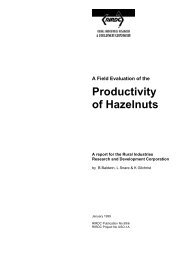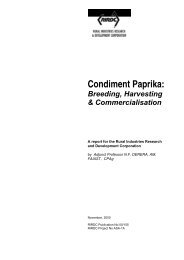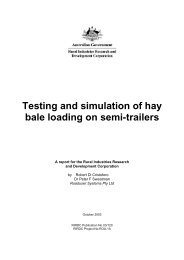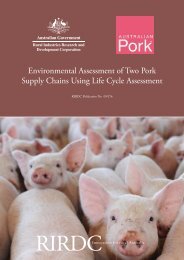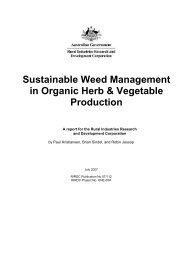The government’s new policy to reduce healthcare spending by reducing reimbursements <strong>for</strong>conventional medicines is likely to encourage self-medication, in tandem with increasing healthawareness, is expected to have a positive impact on sales of preventive products, thereby boostingsales of herbal remedies in the short to medium term.3.4.1 Natural medicines in FranceFrance is one of the world’s leading markets <strong>for</strong> homeopathic products, together with Germany andthe Netherlands. However, the share of homeopathic products as a proportion of total OTC salesremains relatively low as homeopathy is mostly confined to a few sectors, mainly calming andsleeping products, motion sickness remedies and cough, cold and allergy remedies.The sale of homeopathic products is governed by the AFSSAPS and marketing authorisation needs tobe obtained in advance <strong>for</strong> products claiming a therapeutic effect. Some homeopathic remedies canbe partly reimbursed by the national health system. There are currently about 3,500 botanical,biological, chemical and mineral items used to prepare homeopathic medicines.Sales of traditional and herbal remedies are relatively low in France, even though they becameincreasingly popular in recent years, due to their perception as natural products with fewer sideeffects. Herbal remedies are available only in a few sectors, including cough, cold and allergyremedies, digestive remedies, vitamins and dietary supplements and calming and sleeping products,in which they accounted <strong>for</strong> over 10% of value sales. They are also present to a lesser extent inmedicated skin care.Herbal medicines need to be registered by the AFSSAPS health product safety agency, whichpublishes a list of about 200 plants ‘whose use is well established’. The registration of productswhich contain one of these plants follows an abridged procedure. Herbal substance can have up totwo therapeutic indications. Herbal products are generally sold by herbalists, though they are alsoincreasingly available in pharmacies and parapharmacies.According to the trade magazine Le Quotidien du Pharmacien, homeopathic products accounted <strong>for</strong>only 2% of total sales of remedies sold in pharmacies, but have significant potential <strong>for</strong> growth. It isestimated that almost 40% of the French population use homeopathic products at least on anoccasional basis, and more than 30% of French GPs prescribe homeopathic products. Thehomeopathy industry achieved a sales turnover of EUR235 million in 2003.The leading producer of homeopathy products in France is Boiron. The company sells the wellknownCocculine motion sickness remedy brand, as well as the popular cold and flu remedyOscillococcinum. The second leading player after Boiron is Laboratoires Dolisos, a division ofLaboratoires Pierre Fabre, whose turnover accounted <strong>for</strong> 6.5% of the group’s total in 2002.3.4.2 Industry RegulationRegistration of non-prescription medicines in France is carried out in accordance with EU rulesregarding quality, safety and efficacy. The registration procedures of herbal medicines may beshortened where the plant or plant extracts is officially listed by the French Health Products SafetyAgency.As far as European legislation is concerned, the EU Directive on Food Supplements, adopted in 2002and dealing with vitamins and minerals, aims to harmonise the statements displayed across allcountries. This directive was incorporated into French legislation at the end of 2003. The EU35
Directive of 2 December 1994 sets out classification of medicines throughout the EU and applies thefollowing <strong>for</strong> herbal products:‣ Herbal medicines – those products that contain only plant and/or plant materials as activeingredients‣ Homeopathic medicines: homeopathic medicines in France are required to be registeredthrough the Medicines Agency be<strong>for</strong>e they can be marketed or distributed. Registration byreference is not allowed and resulted in some complaints from parallel importers to the EU,that it did not follow EU Law. In early 2000, the French government announced that it wouldmake parallel importation of medicines possible via the abridged procedure in the near future.The EU Food Supplement Directive, due to become law in 2005, aims at harmonising nutritionalsupplements across Europe, and comprises a list of 300 ingredients to be banned, as well assupplements which can be sold, and dosage limits.3.4.3 DistributionMedicine distribution remains under the control of the Directorate General <strong>for</strong> Health at the Ministryof Social Affairs and Health.The distribution of OTC products in France is largely dependant on pharmacies, accounting <strong>for</strong> over84% of value sales in 2003. This dominance also partly reflects the fact that semi-ethical medicines,representing the majority of OTC sales, are distributed exclusively through pharmacies. According toFrench legislation, most non-reimbursable products, including those bought without prescription,have to be requested from the pharmacist and are not freely available on a self-service basis. Therewere about 22,700 pharmacies in France in 2003.However, OTC products are increasingly becoming available in channels such as parapharmacies andgrocery outlets. Parapharmacies, which are often part of a chain, cannot sell prescribed medicines,even though they are often managed by qualified pharmacists. Sales through parapharmacies consistof non-<strong>medicinal</strong> products or those not requiring an AMM (Autorisation de Mise sur Marche) – anauthority regulating the marketing of pharmaceuticals. Similarly, grocery outlets can only sell alimited range of OTC products.Grocery outlets, supermarkets and hypermarkets have also been strengthening their position in theOTC market in recent years. These outlets are particularly strong in self-medicated products such ascough, cold and allergy remedies, vitamins and dietary supplements and wound treatments. Theseoutlets benefited from the fact that they offered similar products to pharmacies at lower prices,especially in vitamins and dietary supplements and wound treatments.Health food shops as a distribution point remains small in France accounting <strong>for</strong> only 0.6% of OTCsales in 2003. A typical product range stocked by health food stores includes vitamins, dietarysupplements, health and dietetic foods.36


